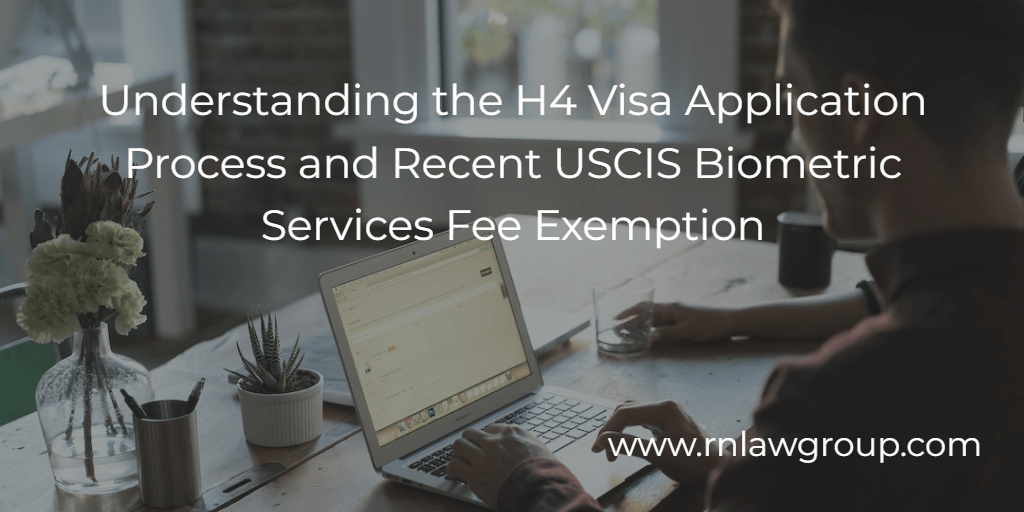
Understanding the H4 Visa Application Process and Recent USCIS Biometric Services Fee Exemption
The H4 visa serves as a vital immigration document for immediate family members of H1B visa holders, specifically spouse and children under the age of 21, allowing them to join their loved ones in the United States. In this article, we will explore the purpose of the H4 visa, the steps involved in obtaining it, and an important recent announcement from U.S. Citizenship and Immigration Services (USCIS) regarding the exemption of the biometric services fee.
The H4 visa’s primary objective is to facilitate family reunification by enabling immediate family members, including spouses and unmarried children less than 21 years of age, to join H1B visa holders who are employed in the United States. This visa category ensures that families can stay together while one member of the family contributes to the American economy through employment. There are specific steps and benefit considerations to consider when determining if one is eligible to request H4 visa status in the United States.
USCIS Recent Biometric Services Fee Exemption Update:
A recent USCIS announcement has exempted applicants from the biometric services fee for Form I-539, Application to Extend/Change Nonimmigrant Status, effective October 1. This means that applicants filing Form I-539 on or after October 1 will not be required to pay the $85 biometric services fee as part of the application process.
If an application is postmarked on or after October 1, the biometric services fee should not be included. However, if an application is filed before October 1, certain filers may still be scheduled for an Application Support Center (ASC) appointment for biometrics collection. USCIS will provide information about appearing for the biometric services appointment if it’s deemed necessary.
In cases where the biometric services fee is mistakenly submitted and is separate from the Form I-539 fee, USCIS will return the biometric services fee and accept the Form I-539. If the biometric services fee is mistakenly combined with the paper-based Form I-539 filing fee, the entire application may be rejected as an incorrect filing. Please be sure to always file the application with one separate payment/check of the filing fee alone.
This biometric services fee exemption applies to all I-539 applicants filing on or after October 1, including those requesting an extension of stay in or change of status to H-4, L-2, or E nonimmigrant categories, for which USCIS had previously suspended the biometrics requirement through September 30, 2023.
General Steps to Obtain an H4 Visa:
In order to obtain an H4 visa, individuals typically comply with the following steps:
- Determine Eligibility: Ensure that you are eligible for an H4 dependent visa based on your relationship with the H1B visa holder. You must be able to provide either a valid marriage certificate showing a spousal relationship with the H1B visa holder or a birth certificate to show parental relationship with the H1B visa holder.
- Complete Form I-539: Fill out the most current edition of Form I-539, Application to Extend/Change Nonimmigrant Status, to request an H4 visa or extend an existing one. This application can presently be prepared by the applicant themselves and submitted online via the applicant’s USCIS Account or be prepared and filed via mail directly to U.S. Citizenship and Immigration Services (USCIS) by a legal representative. Form I-539A, is used to apply for the H4 visa of eligible children concurrently with the spouse’s H4 application. Please note: The H4 visa may also be requested directly from a U.S. Consulate in the applicant’s home country or another county’s U.S. Consulate that provides services for third-party national visa stamping.
- Gather Supporting Documents: Collect the necessary supporting documents, such as proof of relationship, proof of current visa status of the H4 applicant and the H1B primary visa holder, and more. Be sure to read the Form I-539 instructions to provide the full list of required documents to USCIS.
- Pay the Filing Fee and Submit to USCIS: Pay the filing fee associated with Form I-539. Please note that USCIS recently announced an exemption for the biometric services fee, as explained below. This additional biometrics fee is not required to be paid in order to successfully file the H4 application or any other nonimmigrant status requested via Form I-539, as of October 1, 2023. It is also very important when submitting the I-539 application to USCIS that the application packet is mailed to the correct USCIS service center address.
- Historical Need for Biometrics Appointment:
In the past, USCIS required biometric data from visa applicants, including fingerprints, photographs, and a digital signature. The purpose was to conduct background checks and verify the identities of applicants for national security and immigration system integrity. An applicant would mail the completed Form I-539, along with all supporting documents and the filing fee and biometrics fee, to the address specified in the instructions. USCIS would then review the application, conduct background check based via a specific biometrics appointment notice, and verify the provided information. Finally, USCIS would ultimately notify the applicant of the decision of their application and or if they needed additional information before approving the application and issuing an H4 visa to allow the applicant(s) to join your H1B visa holder family member in the United States.
While H4 visa holders do not have the same employment privileges as H1B visa holders, they still enjoy several benefits while residing in the U.S. and maintaining their H4 visa status such as: 1) legal status and presence in the U.S.; 2) eligibility to enroll in educational programs and attend schools, colleges, and universities; 3) apply for and obtain a driver’s license; 4) travel within and outside the U.S. without any restrictions so long as there is a valid visa stamping for outside travel; 5) healthcare access, often through the health insurance coverage provided by the primary H1B visa holder’s employer; and 6) under certain circumstances, H4 visa holders may be eligible to apply for a change of status to another non-immigrant visa category if they qualify for it. Perhaps the most significant benefit is the ability to live with and support their family members working in the U.S., fostering family unity and stability.
This, of course, is not an exhaustive list of H4 visa benefits, but it paints a broad picture of benefits that can be expected in this nonimmigrant visa category. It is also important to note that the specific benefits available to H4 dependents can vary depending on individual circumstances, the state of residence, and changes in immigration regulations. Additionally, H4 visa holders should always be aware of the terms and conditions of their visa status to ensure compliance with U.S. immigration laws.
In conclusion, the H4 visa remains a critical means for family reunification while one member works in the U.S., and the recent USCIS biometric services fee exemption represents a significant development in simplifying the application process for H4 visa applicants and other nonimmigrant categories requested via Form I-539. As immigration regulations and procedures continue to evolve, it’s essential for applicants to stay informed about the most current USCIS guidelines and requirements to navigate the process successfully.
Reddy & Neumann has been serving the business community for over 20 years and is Houston’s largest immigration law firm focused solely on U.S. Employment-based immigration. We work with both employers and their employees, helping them navigate the immigration process quickly and cost-effectively.
By : Jeanetly Garcia
Jeanetly Garcia advises employers and individuals through all phases of the non-immigrant visa process. As an attorney in the H-1B Department at Reddy Neumann Brown PC she is experienced in filing nonimmigrant petitions and applications for immigrant benefits, as well as, responding to USCIS issued requests for evidence concerning an array of legal issues.

